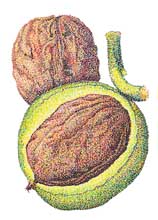

Using seedlings from Lambs Curly I found a few very unique almost columnar black walnuts that develop a strong pyramidal growth habit. These trees are basically the result of finding 6 individuals out of 2000 that had developed small branching on young seedlings and had long full green foliage even in the heat and humidity of summer. They appeared to be hybrids but not enough to suspect what or where they hybridized with as the characteristics were too nebulous to tell. Lambs Curly was a west Michigan tree that had curly grain and people had grafted it as well as distributed it as seedlings. I purchased the seeds from a tree in central Michigan that was said to be a grafted type.
Three of these trees produce very few nuts and that is what I am using as the seed source as they are also the most vigorous growing over the years and tall. The seedlings grown from them are also the most vigorous and straight growing. The other three trees in our plantings are heavy producers of nuts and will be listed under a separate listing shortly.
Often tree seedlings vary slightly from their parents. It is interesting to note how closely these trees grow. I have had a few people who are experts in black walnut and tell me they are curly grained and you can tell by the bark. To be honest, I am not sure if that is true but I plan to have them evaluated again to see if they can be produced from seed and yet still produce a curly grain. The identical nature of the trees makes me think the wood quality must be quite nice and the bark does have a very unique look to it.
The nuts of Fastigiate Strength are twice the size of most black walnuts weighing up to an ounce once cleaned in a moist condition. However the shell thickness is also twice that of a normal black walnut. The crack out percentage appears low for these as well. The parent trees are close to the heavy producer pyramidal black walnuts. So very good cross pollination from superior individuals with good foliage retention and overall tree health. These are collected from two low yielding trees next to each other but have huge nuts.
Prolific Fastigiate Strength : Tree has dominant pyramidal-fastigiate form with strong central leader but also a fantastic nut producer. Seedling is next to each other in the planting which is a single row. Insane yields on this one often bending the tree over when it over fruits. Tends to be biennially bearing. Out of stock for 2022.
To Germinate the Seeds: Store in a moist media for 90-12 days at 38 to 40 F. Seeds will sprout after 7-30 days. If planted outside, protect from pilfering and keep the nuts moist in peat until planting. Cold dormancy is a must for walnut. If not all of them sprout due to their thick shells, let them go through another dormancy.
| Plant Specs |
| Genus & Species |
Juglans nigra |
| Seed Source |
Michigan Ecos Lambs Curly |
| Height (ft) |
70-100 ft. |
| Width (ft) |
20-30 ft. Strongly pyramidal with a narrow crown. |
| Pollination Requirements |
Wind pollinated. Will cross with other walnuts. |
| Soil |
Loam or sandy loams ideal. Our parent trees are growing in an area with a shallow top soil. |
| Climate |
Zone 3-8 |
| Ease of Cultivation |
As a nut tree, one of the best to grow from seed. Retains parental characteristics and can be produced in a way to develop what is called a land race seed strain. Fastigiate Strength produces vigorous seedlings even in dry upland soils and could be used to develop black walnuts for colder and drier locations that previously found. |

